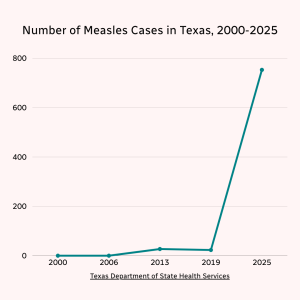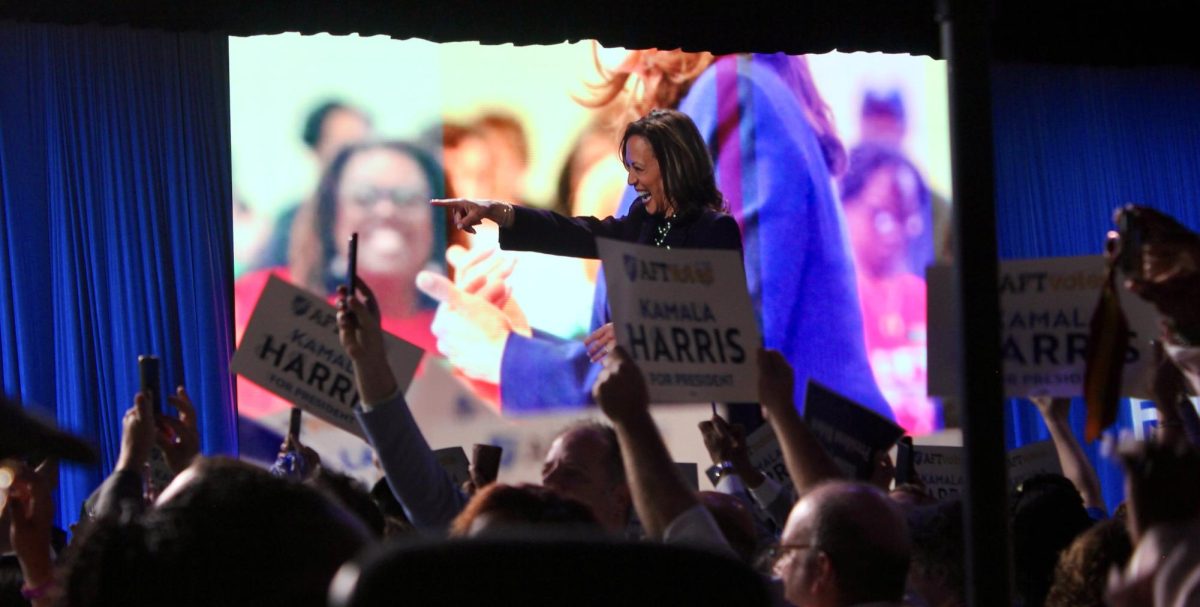In 2000, health officials declared measles eliminated in the United States, but 25 years later, domestic cases are surging.
In Texas, the health department confirmed 750 cases of the disease since January. In March, the Houston Health Department issued an advisory warning for exposed citizens to “contact their healthcare provider before visiting a medical facility to prevent potential exposure to others.”
Measles contagiousness sets it apart from similar diseases. If one person is infected, as many as nine out of 10 people can become infected if they are not protected. Its effects include pneumonia, seizures, and brain damage. According to Dr. Kari Simonsen, a pediatric infectious disease physician at the University of Nebraska Medical Center, measles can spread to people long after the infected person has left a room, including in waiting rooms and emergency departments.

“As pediatricians and as physicians in the US, we need to be thinking more about measles as a possibility when we see people who are sick with things like fever and rash,” Simonsen said in an interview with Headliners in Education.
Texas is currently facing the largest outbreak of measles in 30 years. With fewer Texans getting vaccinated, Simonsen explained, physicians need to keep the outbreak more top of mind. She also warned that because the measles vaccine protects patients against mumps and rubella, opposition to getting vaccinated could mean the prevalence of all three diseases in the United States again.
“Almost all kids got sick with all three of these viruses before vaccines were available,” Simonsen said. “We don’t want to go back to that kind of thing.”
Not only do anti-vaccination movements discourage parents from opting to vaccinate their children, but they also downplay the effects of the measles outbreak, according to Brandy Zadrozny from NBC News. Mary Holland, president of anti-vaccine organization Children’s Health Defense, said on an episode “This Week” that government responses to the outbreak were “fearmongering,” calling measles just “a couple of spots.”
And this anti-vaccine rhetoric is appealing to Texas voters. Anti-vaccine advocates support candidates for office who adopt these positions. Politicians have attempted, and to some degree succeeded in weakening Texas school vaccine requirements over the past 20 years.
These beliefs directly influence vaccine hesitancy. For example, some Texans confuse Emergency Use Authorizations — the use of unapproved medical products to prevent a life-threatening emergency — with vaccines. This belief prompts patients to believe that there is minimal research conducted on the safety of vaccines. In fact, the Texan parents of a 6-year-old child who died from measles have stood by their decision not to vaccinate her.
According to Simonsen, individuals often have personal reasons to worry about vaccines, whether because of family history or their own research. Measles can act as a “harbinger” of other preventable diseases, according to University of Texas Health epidemiologist Dr. Catherine Troisi. Should the measles cases continue at this growing rate, the United States is at risk of losing its measles elimination status.
“I hope that we’ll continue to have sufficient numbers of people getting vaccinated so that we won’t end up with a situation like we had in the pre-vaccine era,” Simonsen said.
(Editor’s note: To learn more about measles outbreak in Texas, please visit the Texas Department of State Health Services.)
–July 13, 2025–






